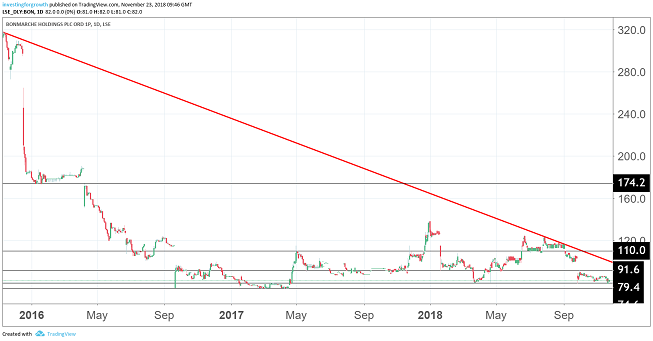Stockwatch: A toad worth kissing for 9.5% dividend yield?
23rd November 2018 10:20
by Edmond Jackson from interactive investor
Only time will tell whether this small-cap really is one of Warren Buffett's toads, but companies analyst Edmond Jackson thinks yield security could trigger a re-rating.

"Never kiss toads" is a longstanding adage of Warren Buffett. He means the way he amended his stock-picking from raw quantitative "value" criteria espoused by Benjamin Graham, towards a more qualitative assessment of competitiveness, pursued by Phil Fisher, the mid-20th century growth stock guru.
A dilemma with "value" is ostensibly cheap price/earnings (PE) ratios and high dividend yields luring you into inherently underperforming businesses (or those late-cycle). One profit warning leads to another; you might average down but you risk becoming mentally trapped. In Buffett's words: "I kept kissing and they continued to croak."
Judge for yourself whether I've fallen this way regarding FTSE Fledgling-listed Bonmarche Holdings, which I first drew attention to at 270p in June 2014 – when its broker projected £13 million pre-tax profit for a PE multiple sub-13 times.
Retailing clothing to women over 50 ought to benefit from a strong demographic and, indeed, the table shows a broadly sound company: despite its operating margin reducing from about 7% to 4%, turnover, profits and cash flow are respectable and the company paid a generous dividend yielding 6% to 9% – that is, for buyers in the last two years' trading range of 75p to 135p.
The company has become another victim of weak high street sales, scrambling to reinvent online. It changed CEO in August 2016, though the story has remained quite the same, and weaker sterling under Brexit has raised the cost of importing clothing.

Source: TradingView (*) Past performance is not a guide to future performance
Marketing skills are in question too
The stock de-rated from around 300p at end-2015 when the CEO resigned after "very challenging trading particularly since Black Friday". Bonmarche appears to have difficulty around this end-November annual retailing import from the US, although retail analysts have warned of a general negative effect on the sector – bringing sales forward and at lower margin, than overall net benefit.
Even now, Bonmarche has a caveat to its outlook:
"Providing sales during the key Black Friday through to Christmas trading meet expectations".
Bluntly, though, at least one woman in its targeted age-range has told me (a year or more ago, I should add) Bonmarche clothes are naff. Personal tastes aside, maybe it's a lesson to stick to investment areas one is competent to understand, beyond financial value metrics. Yet designs are an intangible able to improve with new initiatives than say, Debenhams being loaded with debt and long-leasehold contracts.
Current CEO Helen Connelly speaks of extending size/length options online and adding other brands, which sounds piecemeal than revolutionary. Stock management controls have also been improved, and stores modernised to improve the shopping experience, quite how this all will prove for revenues.
Positive market reaction to interim results
Trading in this stock is now thin, suggesting it's off-radar at its current capitalisation around £42 million. That can help the stock recover if a turnaround gains traction. In reaction to latest interim results, the price dipped to 78p but has settled around 82p, as if a 9.5% yield around this level – the board so far intending to pay a 7.75p total dividend in respect of the current financial year – is providing support, with risks broadly priced in.
The numbers maintain a theme of keen growth in online sales – up 28.9% to £13.5 million - checked by weaker store sales – down 4% to £99.4 million; thus a way to go before the group tips positively overall if high street shopping declines further.
The near-term prognosis isn't great: market research firm Mintel predicts online shopping and food retailers will be winners this Christmas as consumers keep a tight rein on spending on clothing, home-ware and other non-food items, with online sales rising over 14% to £5.6 billion or nearly 12% of all retailing spending.
The board has re-iterated last September's downgraded forecast for annual pre-tax profit of about £5.5 million. In the table I've retained the old forecasts as published, partly because even this latest guidance involves risks and the numbers serve as a warning about market complacency late in the economic cycle.
Steady transition towards online retailer
Perhaps in order to avoid onerous charges, exiting shop leasehold arrangements early, Bonmarche is making a steady transition according to leases expiring. In the six months to end-September, five stores were closed either because locations were not great or rent reductions were not forthcoming. One new store opened in Aberdeen is projected to make a positive return in about 18 months. There's an increased £1 million provision for impairment of store fixed assets, which shaved headline interim pre-tax profit to £2.3 million.
Thus, Bonmarche will remain viewed by investors as a high street retailer, and priced for such risks, it being tricky to assume its low PE and high dividend will attract a bidder a 52.4% stake remains with Sun European Partners, the private equity owner that floated it in November 2013.
It's not unknown for private equity groups to trade with each other but doesn't really follow that Sun would – by implication – cede value once a turnaround gets going, having owned the business for nearly seven years.
| Bonmarche Holdings - financial summary | Consensus estimates | ||||||
|---|---|---|---|---|---|---|---|
| year ended 31 Mar | 2014 | 2015 | 2016 | 2017 | 2018 | 2019 | 2020 |
| Turnover (£ million) | 164 | 179 | 188 | 190 | 186 | ||
| IFRS3 pre-tax profit (£m) | 8.0 | 12.4 | 9.6 | 5.8 | 8.0 | ||
| Normalised pre-tax profit (£m) | 11.4 | 12.5 | 9.8 | 7.3 | 9.5 | 9.3 | 10.6 |
| Operating margin (%) | 7.1 | 7.0 | 4.5 | 3.0 | 4.2 | ||
| IFRS3 earnings/share (p) | 22.0 | 19.8 | 15.7 | 9.1 | 9.1 | ||
| Normalised earnings/share (p) | 35.0 | 19.8 | 16.2 | 12.1 | 12.8 | 14.5 | 16.7 |
| Earnings per share growth (%) | -44.1 | -18.3 | -25.4 | 6.0 | 13.3 | 15.2 | |
| Price/earnings multiple (x) | 6.4 | 5.7 | 4.9 | ||||
| Annual average historic P/E (x) | 7.9 | 13.0 | 8.3 | 6.8 | 8.0 | ||
| Cash flow/share (p) | 39.8 | 23.3 | 21.9 | 15.7 | 17.9 | ||
| Capex/share (p) | 19.6 | 13.6 | 10.3 | 22.7 | 14.0 | ||
| Dividend per share (p) | 4.4 | 7.1 | 7.1 | 7.1 | 7.8 | 7.8 | |
| Yield (%) | 8.7 | 9.5 | 9.5 | ||||
| Covered by earnings (x) | 4.5 | 2.3 | 1.7 | 1.9 | 1.9 | 2.2 | |
| Net tangible assets per share (p) | 21.5 | 48.6 | 58.1 | 58.1 | 42.1 | ||
Source: Company REFS Past performance is not a guide to future performance
Near-term dividend looks secure relative to cash
A 7.75p per share payout looks very full relative to current earnings guidance, yet feasible given its £3.9 million cost relative to end-September cash of £10.4 million. Mind there is variability in the cash position, down from £16.1 million like-for-like and was £5.3 million at the March year-end. This is in context of £32.7 million net assets of which 25% constituted intangibles; there being no real debt beyond £775,000 financial liabilities.
The sore thumb sticking out is £38.8 million trade payables versus £12.6 million trade receivables, in a context where the current ratio (of current assets to current liabilities) is 1.3 times. Managers should clarify much imbalance otherwise it creates suspicion that profits are being supported by long payment terms to creditors. The imbalance has existed for years however, not as if a recent occurrence would have boosted profit.
Brexit issues likely weighing also
Weaker sterling raises import costs for clothing retailers, and Bonmarche also cites a risk of import duty, although there's no basis for this in World Trade Organisation rules, should the UK/EU revert to them instead of May's deal.
As I've explained before, my working assumption is for a lot of political posturing in weeks ahead, and for the current proposed withdrawal arrangement initially to be voted down by parliament, but for cooler heads to pass it on a second vote. There isn't enough support to topple Mrs May with an alternative vision, nor is parliament inclined to exit the EU with "no deal".
While highly speculative, I think investors should bear in mind a scenario where sterling and risk assets jump in value, and is why it's worth keeping the likes of Bonmarche in the frame.
Christmas trading update is the next hinge
Recovery buyers might like to watch how Brexit and consumer spending issues evolve in weeks ahead, but other things being equal the stock looks likely to bump along sideways given its yield support, until post Black Friday trading is clarified on 25 January.
I am inclined to give management the benefit of the doubt here; with more adept marketing there ought to be a worthwhile business to wrest. Time will tell, and will also reveal whether I've fallen in love with a toad. But my stance is: Add.
*Horizontal lines on charts represent levels of previous technical support and resistance. Trendlines are marked in red.
Edmond Jackson is a freelance contributor and not a direct employee of interactive investor.
These articles are provided for information purposes only. Occasionally, an opinion about whether to buy or sell a specific investment may be provided by third parties. The content is not intended to be a personal recommendation to buy or sell any financial instrument or product, or to adopt any investment strategy as it is not provided based on an assessment of your investing knowledge and experience, your financial situation or your investment objectives. The value of your investments, and the income derived from them, may go down as well as up. You may not get back all the money that you invest. The investments referred to in this article may not be suitable for all investors, and if in doubt, an investor should seek advice from a qualified investment adviser.
Full performance can be found on the company or index summary page on the interactive investor website. Simply click on the company's or index name highlighted in the article.
Disclosure
We use a combination of fundamental and technical analysis in forming our view as to the valuation and prospects of an investment. Where relevant we have set out those particular matters we think are important in the above article, but further detail can be found here.
Please note that our article on this investment should not be considered to be a regular publication.
Details of all recommendations issued by ii during the previous 12-month period can be found here.
ii adheres to a strict code of conduct. Contributors may hold shares or have other interests in companies included in these portfolios, which could create a conflict of interests. Contributors intending to write about any financial instruments in which they have an interest are required to disclose such interest to ii and in the article itself. ii will at all times consider whether such interest impairs the objectivity of the recommendation.
In addition, individuals involved in the production of investment articles are subject to a personal account dealing restriction, which prevents them from placing a transaction in the specified instrument(s) for a period before and for five working days after such publication. This is to avoid personal interests conflicting with the interests of the recipients of those investment articles.